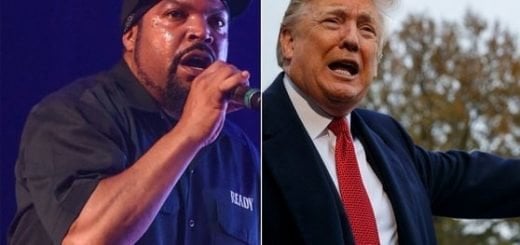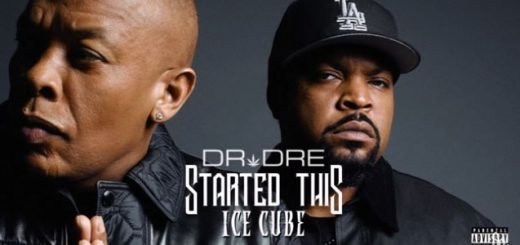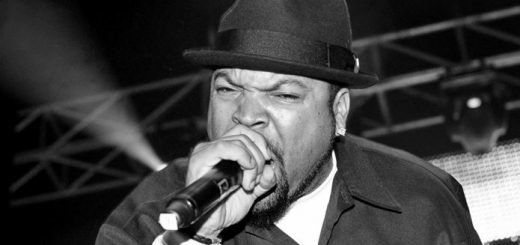Ice Cube’s “Black Korea” Lyrics Meaning
The United States can be a perplexing place to live sometimes. America is widely dubbed the land of opportunity. However, who the system favors may be deemed confusing or even unfair to some.
For instance, within the inner-city Black community, many, if not most of the formal businesses are not owned by African-Americans. Instead, the system may support the likes of Koreans and other Asians to set up shop therein instead.
And when some confusion transpires between one of these groups and the Black residents, the potential for all hell to break loose does exist. A well-known example of this phenomenon, albeit a fictional one, can be found in the classic Spike Lee outing Do the Right Thing.
But in terms of a real-life example, as fate would have it the infamous Los Angeles riots of 1992 were not only spurred by the beating of Rodney King but also the killing of one Latasha Harlins.
As the story goes Latasha, who was only 15 at the time of her tragic death. She ended up getting into a scuffle with a Korean-American shop owner named Soon Ja Du. Soon was apparently convinced that Latasha was trying to steal something from her store.
By the time all was said and done, Du ended up killing Harlins. She shot her in the back of the head. Then to make matters worse, the legal system penalized Soon via a slap on the risk. And what exactly was Soon’s punishment? She was only sentenced to probation, community service and a light monetary fine.
So resultantly many African-Americans were furious, especially in South Central Los Angeles, i.e. Ice Cube’s hometown, since that’s where the incident took place. And thus we have “Black Korea”.
“Black Korea”
To note, this track is less than 50 seconds in length. This length would undoubtedly qualify it as one of the shortest rap songs in history. But again, Cube’s delivery is so effective that this piece became an iconic song.
That being said, it is worth noting that it was actually banned in some parts of the world.
The song commences by alluding to what we harped on earlier, i.e. this dormant frustration, if you will, being extant within African-American community due to the fact that the businesses are owned by “outsiders”.
Within context, O’Shea may angrily refer to “Oriental one penny counting moth-rf*-kers”, which would then cause some analysts to deem this track racist. But as touched on earlier, what he’s actually pointing to is a problem more macrocosmic than there being beef between two particular races.
Indeed, Ice goes on to reveal that the reason he doesn’t like these people is because they ‘think every brother in the world’ is out to steal. Or put differently they are the racist, and what he’s speaking to more specifically is the practice of racial profiling.
This Bloody Racial Profiling!
Racial profiling, most simply put, is for example when store security pays extra, individual attention to Black customers as opposed to those of other races. In the United States, this is due to there being a prevailing stereotype that African-Americans are thieves.
Back when Ice Cube dropped this song, him highlighting that racial profiling actually exist may have been considered an exaggeration by some. But in the years since then, the system at large has more or less come to admit that this practice, against Blacks in particular, is a real thing.
That said, places like South Central Los Angeles also possess very-serious crime problems. And Cube acknowledges that also, i.e. one of the reasons he’s being profiled is because these shop owners are afraid he’s going to try to pull a stickup.
But for those of us who have actually gone through such experiences, we would all likely agree that being treated in such a manner feels like an insult. Imagine being singled out and followed or personally surveilled in a department store even though you have no intention to steal! And all this because of your skin color!
As implied in the lyrics and furthermore exhibited in the Latasha Harlins case, such suspicions can sometimes lead to conflict. So Ice Cube, in his own special way, is letting these Asian shopkeepers know that he doesn’t approve of being treated like that. He wants these racist shopkeepers to know that he “got a job” and is in fact just coming to do some legit shopping.
The Warning!
Furthermore, the vocalist’s reaction is that if they keep treating him so, he’s going to organize “a nationwide boycott”. That is to say that he’s going to formally encourage his people to no longer shop at these establishments, where they are in fact the main, if not sole, patrons.
A normal resident may not wield such influence, but Ice Cube has “juice”. And when Cube says he’s got “juice“, what he means by that is that he’s got clout and recognition, in the ‘hood. So he’s levying what he perceives to be a credible threat towards these racist businesses.
But what is the meaning of “Black Korea”?
It is at the closing of this track’s singular verse where we find the title, “Black Korea”. Most simply explained in terms of its meaning, Cube goes on to compare the likes of Asian shop owners in the Black community to being an occupying force.
Making such a claim is obviously an exaggeration. However, more realistically what he is likely referring to is an idea like these people trying to exert economic influence/superiority over ‘hood residents.
He concludes it all in traditional gangsta rap fashion, with a sound “moth-r f–k you” against presumably these selfsame entities.
The Takeaway
As noted earlier in this post, these same types of annoyances and systemic shortcomings are indeed real and palpable. They were especially pronounced around the time “Black Korea” came out, as a few months after its dropping the world witnessed the 1992 L.A. riots. In the process, a settlement known as Koreatown was one of the primary targets (though apparently law enforcement blockades also contributed to that reality).
So perhaps those pundits who at the time were preoccupied with labeling Ice Cube a racist should have instead been paying more attention to the larger problem he was harping on.
And with that said, by the looks of things outsiders running most of the businesses within the African-American community is still very much the norm. In places like Brooklyn, we are now even witnessing the gentrification of Black neighborhoods.
Moreover during the recent peak of the Black Lives Matter movement we’ve had some prominent figures, such as Beyoncé, propagate the idea of conscientiously seeking out Black-owned businesses to patronize.
So again, the laws of the United States may be considered enviable as far as civil/human rights are concerned. But as illustrated by songs like “Black Korea”, there are still some ways to go.

Ice Cube
It’s safe to say that when Ice Cube came out as a member of the controversial gangsta rap act N.W.A. in the late 1980s, perhaps no one but himself would have predicted that he would go on to not only be a legend. Today, not only is he a legendary rapper, but he is also Hollywood A lister and a notable entrepreneur.
But again, all of these accomplishments harp back to music career. As an artist, Cube established himself as one of the most-outspoken rappers in history. And as a soloist he experienced his peak output during the early 1990s. This was shortly after the dissolution of the N.W.A.
For example, “Death Certificate”, the LP which “Black Korea” came out as a part of marks the second highest he ever reached on the Billboard 200. On this prestigious listing, the project peaked at number 2.
The album’s follow-up, 1993’s “The Predator”, marks the only time to date that Cube topped the Billboard 200 on his own.
To reiterate Ice Cube, especially back in the days before he went Hollywood, was a very don’t-give-AF artist, and outings like “Death Certificate” aren’t for the weak at heart. “Black Korea” is one of the songs contained therein that has been considered even more controversial than the album at large. For instance, the British release of “Death Certificate” saw “Black Korea”, as well as the Ice Cube classic “No Vaseline“, formally omitted.
Release Date of “Black Korea”
On 29th October, 1991, Ice Cube officially released this controversial song. “Black Korea” came out as part of Cube’s “Death Certificate” album.
“Black Korea” Credits
Ice Cube wrote “Black Korea” and also lent to its production. He accomplished the latter feat alongside regular collaborator Sir Jinx. FYI, Sir Jinx happens to be Dr. Dre’s cousin.
Ice has stated categorically that “Black Korea” wasn’t targeting every Korean American. He said the song was directed at a tiny fraction of Korean American shopkeepers. According to him, he and his friends actually experienced racial profiling in these shops (whose Asian owners he targeted).
He has stressed on the fact that he respects Korean Americans. Owing to this, he believes he can’t incite violence or hatred against them.
Fans React: Racist or Not?
Many fans feel that this track showcases Ice Cube’s anger on the situation that many Black people face, almost on a daily occurrence, and are either sympathetic or find it relatable. What’s more important is that they know the track is in response to a ninth-grader Latasha Harlins, who was shot and killed by Korean store owner, Soon Ja Du, on 16th March, 1991.
One shared that although it was unfortunate what happened to Harlins, Cube should be careful not to generalize his comments. According to him, Cube shouldn’t make it seem that all Koreans have a beef with all Blacks, as that’s not the truth. He goes on to say that he would understand why he responded the way he did if it was a genuine feeling of anger, or wanting justice.
And to others, they’ve expressed that had the tables been turned, Koreans wouldn’t be attacking the Blacks like they did. One such case was raised by a fan who shared that in 2007, a 7-year-old Korean boy was killed by a 19-year-old Black teenager as he didn’t want to give him his money. Koreans never retaliated by attacking all Blacks after this.
Some other fans also shared that Ice Cube sounded like he was predicting what would happen the year after this song was released – the LA riots in 1992.
On a more positive (or dreamier) note, one fan expressed that neither color is right or superior to the other, and misunderstandings can be resolved or avoided if everyone just put in the effort to understand each other. Once this cultural gap is mended, everyone will be able to coexist on this Earth.

The “Death Certificate” Album
Cube released his second studio offering, “Death Certificate”, on October 29 of 1991. This project is regarded as one of his most essential works. It was put out by the following record labels:
- Priority Records
- Lench Mob Records
The album is a follow up to the rapper’s maiden studio album “AmeriKKKa’s Most Wanted”. It was promoted by two singles. Both singles preceded the official launch of “Death Certificate”.
“Steady Mobbin'”, which is the title of the first single, was officially issued on August 9 of 1991. “True to the Game”, the album’s final single was released on September 14.
Cube teamed up with the following names for the production of this project:
- Boogiemen
- Sir Jinx
In addition to the above-mentioned singles, “Death Certificate” featured a number of much-talked about songs including “Black Korea”, which is a highly controversial tune. The project also included “No Vaseline”, a diss track which the rapper aimed at the members of his former group N.W.A.
Generally speaking, this record could be described as a standout one for Cube. It achieved great success in the US. In America, it landed on the Billboard 200, reaching number 2.
This classic album received a Platinum certification from the RIAA in December of 1991.
To add, “Death Certificate” has been ranked highly on various notable publications’ “Top Albums” list. In 1991 the album was placed at number 16 on the “Best Albums of the Year” list, prepared by The Village Voice.
It appeared at number 8 on a 2005 compilation of “Greatest Hip-Hop Albums of All Time” by MTV.









What makes you think it’s ok to label asian americans as ‘foreigners’?